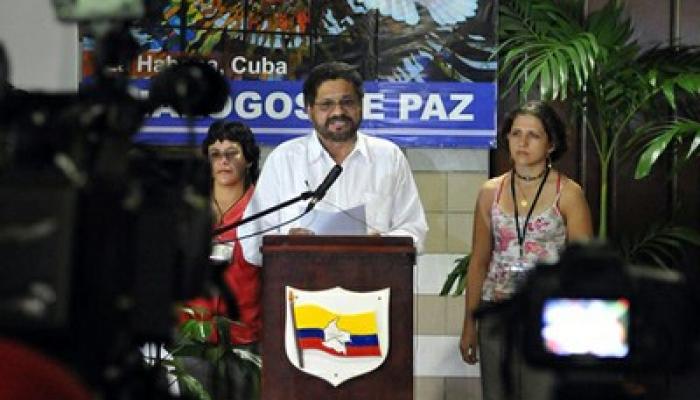Havana, January 16 (RHC-Xinhua) -- The Revolutionary Armed Forces of Colombia (FARC), Colombia's largest rebel group, said Thursday it was ready to negotiate a definitive bilateral ceasefire agreement with the government.
"We welcome the declaration made by President (Juan Manuel) Santos about sending his plenipotentiaries to Havana to immediately discuss bilateral ceasefire," the FARC said in a press release issued in the Cuban capital Havana, where the two sides have been engaged in peace talks since late 2012 trying to end five decades of conflict.
Santos said he instructed government negotiators to speed up the talks toward an armistice. Colombia's Interior Minister Juan Fernando Cristo said such a ceasefire could be agreed to before the two sides sign a definitive peace deal that will end hostilities. He added that a bilateral ceasefire "would be very positive and would speed up the end of the conflict."
Cristo also called on the country's second-largest leftist guerrilla group, the National Liberation Army (ELN), to take up Santos' proposal and enter into similar peace talks.
Since talks between the FARC and the government began in November of 2012, the rebel group has declared a unilateral ceasefire on several occasions. The latest was on Dec 20 and is still in effect.
The government has refused to make a similar move, saying military pressure brought the rebels to the negotiating table and a let-up in fighting would give the rebels a chance to rest and regroup.
That stance led the FARC to accuse the government of making contradictory statements, noting "there is no coherence between words that praise a truce and those that order an escalation in fighting."
The peace talks, suspended for the holidays, are to resume on Jan 26 over the issue of reparations for victims of the conflict.
The two sides have already discussed and reached partial agreements on other issues, including agrarian reform, the FARC's transition to a political party or movement, and the rebels' ties to drug trafficking.
According to government figures, the conflict with the FARC has killed 220,000 people and displaced as many as 5.3 million people.


